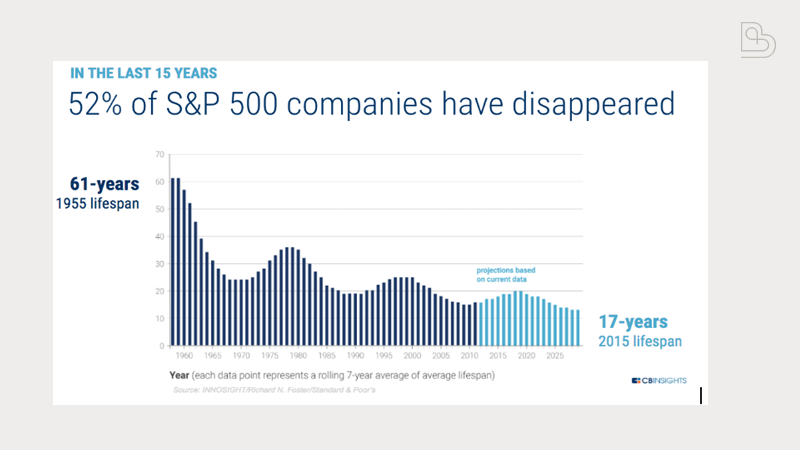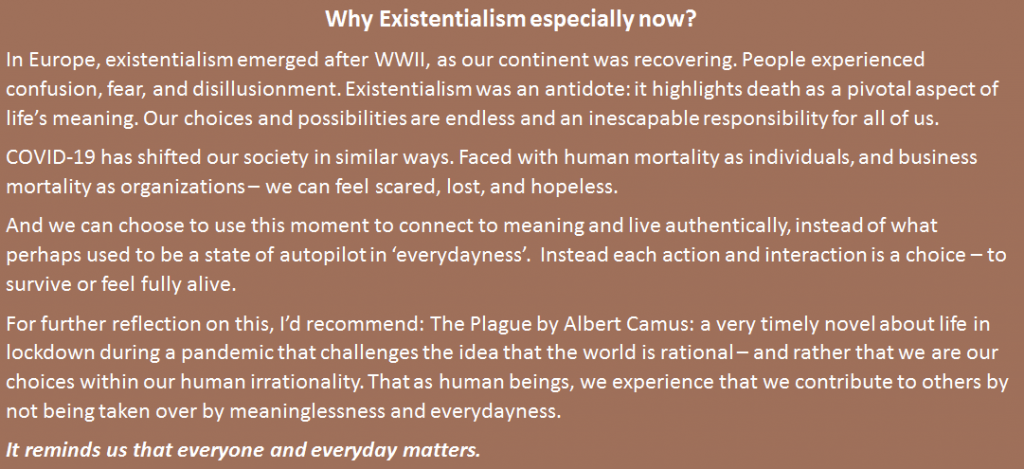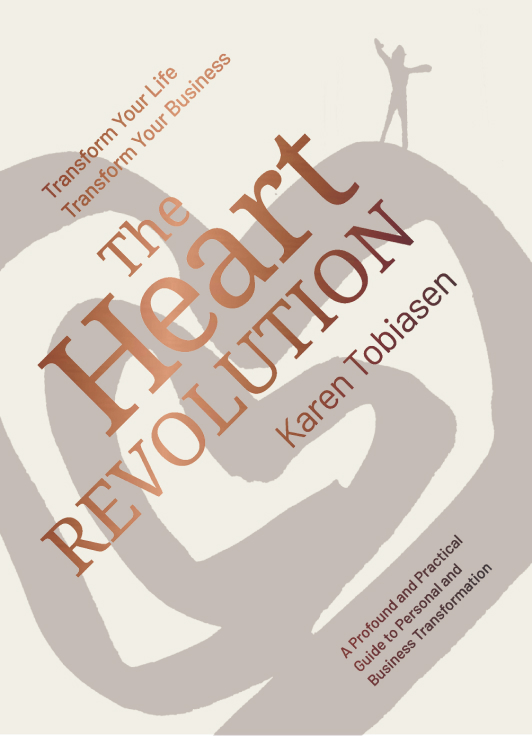“It’s only when we truly know and understand that we have a limited time on earth – and that we have no way of knowing when our time is up – that we will begin to live each day to the fullest, as if it was the only one we had.”
– Elisabeth Kubler-Ross, psychiatrist, pioneer of near-death studies, and one of Time Magazine’s 100 Most Important Thinkers of the 20th Century
The same is true for businesses.

The numbers are in – companies are dying faster than ever before. The average life-span of companies listed in S&P 500 was 61 years in 1958. Today, it’s less than 20 years. McKinsey forecasts that by 2027, 75% of the companies currently in the S&P 500 will have disappeared. They’ll be bought, merged, or go bankrupt. Dead. And that was before the world economy was hit by a global pandemic which makes the outlook even more bleak.
When organizations transform, they find new life and come alive again. For some, it’s almost a resuscitation – they’re on a burning platform and must adapt or die. For others, the business transformation is driven by burning desire – the desire to not just survive, but to come fully alive and thrive, leading the way in performance and into the future.
Essential… or existential?
As individuals in any transformation, we can choose to respond as if it’s something that happens to us or just needs to be done to “keep our job.” Alternatively, we can choose to use it as a moment of renewal for ourselves and come more alive through it, becoming the best versions of ourselves.
COVID-19 has put made us face our own mortality at a higher frequency and proximity than most of us have experienced before. And when we get that snapshot of a moment, we often go into deep contemplation of what we want from our lives, what we’ve accomplished, if we made a difference, what we’ll spend our last precious time on, and many other questions.
But why should we wait for a pandemic to ask ourselves these questions? Why do so many of us still live life on auto-pilot – like our path is already mapped out and we’re merely living out someone else’s plan? That mindset, and limiting belief we may consciously or unconsciously hold, is the core of essentialism. Existentialism, on the other hand proposes that life is the collection of the choices we make in each moment. In contrast with nearly all other life, humans are not pre-determined by ‘laws of nature’ – we have a unique freedom to determine our own behavior.
Whereas essentialism asks “What’s going to happen next?”, existentialism asks “What do I choose to do next?”.
Existentialism invites you to reflect on:
If only I am in control of my life, what do I choose to do with it, to get the most out of it?
Existentialism is so rich in what it can teach us in terms of living our lives – and for the choices we make for how our organizations transform and come fully alive:
Meaning: Existentialism believes it’s up to each of us to find and make our own meaning. We create our own lives with a conscious sense of responsibility.
That responsibility is just as relevant in our work and organizations. In ‘In Search of Excellence: Lessons from America’s Best-Run Companies’, Thomas J. Peters and Robert H. Waterman Jr. argue that the job of the manager is “meaning making” in what could otherwise be a meaningless environment for our people. But does that notion not extend to all of us? To all the every day actions and interactions we choose?
Just as an organization can “die” – like us people – they can also survive, come alive and thrive. When we find meaning and consciously take action to make the most of our work; we fertlize our organization. Equally, as part of the living, breathing organization, when choose not to engage, it’s like a body with an organ that doesn’t fully function. Its life is threatened by our lack of engagement. Do your actions and choices breathe life into your organization, or suck life out of it?
Mortality: If we think our lives are infinite and we’re immortal, we act as if we’ve got time for everything. We don’t need to follow that passion right now, we can do it when we retire. No need to spend time with that loved one right now, we’re too busy.
Companies that don’t face the fact that no one is too big to fail, to go bankrupt, to be pushed out of the market by a competitor, slides into complacency. Looking death in the eye is scary. But sometimes a reminder of “If we don’t change the way we do business, we’ll be out of business” is just what is needed.
Perhaps if Xerox considered a future where copiers would converge with a scanner and printer or Kodak were quicker to recognize the opportunity of digital, they would have found the motivation to change earlier. Facing into mortality brings life a sense of preciousness as well as urgency. What choices can you make to keep your organization and transformation alive?
Authenticity: With each choice, we manifest who we are as people. Authenticity is how we stay true to that. True to our past, as well as open to future possibilities. It’s choosing between possibilities and taking responsibility for our decisions.
Organizations are no different. While technology, disruption and the next revolution are calling on all companies to renew and refresh , it would be a waste for a company to diverge so far from its core that all competencies, skills and legacy knowledge becomes irrelevant. Instead, the most value-creating opportunity for a company are sometimes business ideas that are close enough to its core competencies, yet still exist outside existing lines of business – like when Walmart didn’t try to compete with Amazon for online delivery, but instead leveraged it’s huge physical footprint across the US to launch click-and-collect and add $100billion in value since.
It’s a balance act of making the most of what was built and strengthened in the past, without denying future freedom of new possibilities. It’s transformation and performance working hand-in-hand. Are you and your organization staying true to both your past and future in the choices that you make?
What choices do we have?
Existentialism invites us to recognize we can each be the best CEO of our lives – creating meaning and making the most out of our life, not wanting to die or merely survive. The same mindset can be brought into how we engage with our work and organizations – respecting it as a living, breathing organism that we want to keep alive and help thrive. It guides us to make the most of our lives as organizations, and as a part of the organization.
We can choose to experience work and our organizations as a passive bystander – witnessing the life and transformation of the organization from afar – or we can choose to actively step in and come alive with the business.



